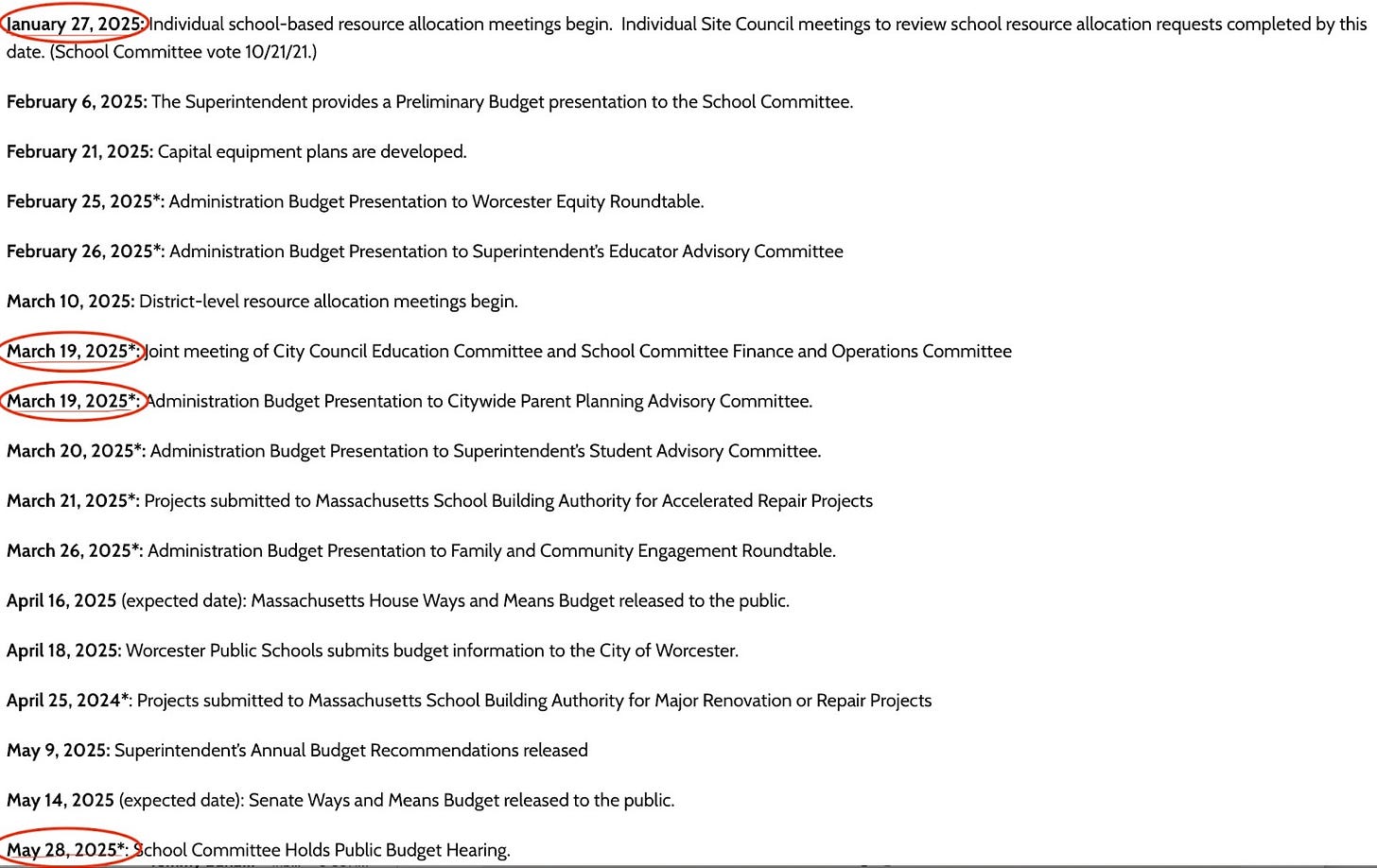WPS in Brief: December 2024
Misogyny in the City, Superintendent’s Mid-year Review, College and Career Readiness, Screen Time
This column is one of four supported by Worcester Sucks subscribers!
Welcome to the 24th issue of WPS in Brief. I started this substack two years ago because many people told me they want to be informed about what’s generally happening in Worcester Public Schools, but they understandably didn’t have the bandwidth to pay attention to all the school committee meetings. When I started there were no journalists covering school committee meetings and the offices of Communications and Family and Community Engagement did not exist. My first post in January 2023 had 446 views, but now as part of Worcester Sucks this newsletter is read by 10 times more. From my perspective, there are more eyes on public meetings, families and students feel more engaged, and communication from the district has improved a hundredfold. We’re moving in the right direction, and the work continues.
As I approach this two year anniversary, I’ve been thinking about the role of WPS in Brief in our community. From the feedback I’ve received from you all, I know there’s a place for this newsletter in breaking down the bureaucratic processes and sharing digestible, relevant information about the governance of our school district. I want to continue to offer an entry point for you to feel informed without feeling overwhelmed. Writing this is a labor of love that I do in my spare time, but public schools are important to me, and I am glad that more people are paying attention to local governance. Thanks for reading.
This month covers two school committee meetings and one subcommittee meeting. I’m also covering some things that didn’t happen in meetings per se, but are important in terms of the governance of our schools.
Let’s get to it:
City Manager’s Contract.
Recently the city council negotiated a new contract for City Manager Eric Batista. The initial contract that came out of standing committee negotiations had, as the Telegram reported, “an additional term stating that at all times, Batista's annual base salary shall be $10,000 above the annual base salary of the next-highest-paid city employee, including Worcester Public Schools employees.” The clause was removed from the final contract before the city council approved it, but it would have meant that the city manager would automatically make more than Superintendent Rachel Monárrez, who manages more than double the employees and close to double the budget. As people pointed out on social media and in public comment, that could have been a violation of the equal pay act. As a public education advocate—a field run mostly by women—it is disturbing to me that the city manager and some city councilors believed this to be reasonable and fair. It emphasizes the general undervaluing of women and of public education in our city. Nevermind how demeaning it is of the professional work and skills of the superintendent, who has a PhD, decades of experience in education, and has been named in a top 25 superintendent’s to watch list for her strong leadership and transparent communication with the public (cough cough).
But the main reason I wanted to write about this is to debunk what City Councilor Moe Bergman, who is the chair of the municipal operations committee that negotiated the contract, said on the city council floor. Bergman said “The city manager's responsible for an almost billion-dollar budget. Taking nothing away from the superintendent, but those responsibilities are half of that. So I personally have no issue saying I could not be comfortable with a contract that would not recognize that.” This statement is not true. The Worcester city manager oversees a budget of $360,042,119 and a little over 2,000 employees. The superintendent oversees 5,060 employees and a budget of $544,809,849. The final budget line for the city budget is about $800 billion, but that includes money for the schools. The city is essentially a pass through for state funds that are mandated to go to public education. The city manager has no oversight of those funds and no oversight of public school employees. Bergman has been on city council for 10+ years and has an advanced degree—he should know this, and I’m not sure why he said what he said. Obviously the city council can pay the city manager whatever they want, but they should at least know what they are paying him for.
Attend your January school site council meeting!
Budget season is here and it’s arguably the most important time to be paying attention to WPS. Above is the updated budget calendar for the 2025-2026 school year budget. In red I’ve highlighted places for the public to offer input. Many of these entry points for feedback were new last year. Note that individual school resource allocation requests must be in by January 27. This means that at the January school site council meetings all principals should be reading over their school-based budget proposal for site council review. This is a great opportunity to learn what your school is prioritizing and offer input at the school level. There are no school site council meetings currently listed on the WPS website, but email your school principal to find out when the January site council meeting will be held.
Superintendent Mid-Year evaluation.
It’s halfway through the academic year, so the superintendent presented a mid-year review on her goals (for specifics, see my original coverage of the goals back in September here.) As requested by the committee in September, the superintendent brought back metrics she hopes to achieve around student academic achievement and they are very ambitious. She explained her rationale:
The targets that I am going to share are pretty bold and very courageous…I spent a lot of time deciding, “This is your evaluation Rachel, are you going to play it safe? Or are you going to be bold and take a risk.” I really thought that this is not about me. This is about the children and the families and the staff that I serve. They deserve to have a leader who is willing to challenge the status quo, take risks, and fail at times. And so if I truly mean we are chasing achievement and not accountability, then I have to start with myself. We might not make these data points, but what I do know is that we will grow. If I don’t put in a bold number, then we will stay stagnant, and I’m not ok with that.
The Telegram covered the nitty gritty of those data points well. And in a weird procedural posturing moment, Dianna Biancheria (district C), Maureen Binienda (at-large), and Kathi Roy (district E) voted against accepting the superintendent’s report, but did not make any motions to amend it.
Meeting Moment.
Sue Mailman (at-large) had an item at the December 5 school committee meeting asking for a policy around 1:1 screen time across all grade levels. At public comment, parent Catherine Holmes spoke on the item, highlighting her concerns around screen time during the school day, and specifically referencing the contract with ST math that mandates that every student do 15-20 mins a day. Since the pandemic the district has been what is known as “1:1,” meaning every kid has an iPad (kindergarten) or Chromebook (grades 1-12). This has meant that teachers can now have students on devices as part of their lessons and also means there’s wide variability in how often devices are used.
College and Career Readiness.
The report of the superintendent for the December 19 meeting was on College and Career Readiness. One of the themes that came out of the superintendent’s listening tour in 2022-2023 was that parents wanted more college and career opportunities for their kids. Out of that came the College and Career Office, led by Chris Kursonis. In the presentation the College and Career Readiness team laid out how they are working strategically on building programs at a district level to ensure equity in access, and also communicating options to families earlier and more often. College Pathways include Advanced Placement, AVID, Dual Enrollment, Early College, and Honors Programs. Career Pathways include Worcester Tech, Vocational Programs at the neighborhood high schools, and an after school vocational program called Innovation Pathways. (FYI, applications for next year open January 6). As Worcester builds new neighborhood high schools, we’ve been adding vocational programs to them with the goal of increasing access. But those programs have not seen the same results as Worcester Tech, mostly because the neighborhood high schools do not have the ability to give students the “shop” time due to scheduling complications.
Inequity in Subcommittees.
This past calendar year was the first that the school committee was reconfigured into two subcommittees (from four). Last term, there were six members who served on two subcommittees each. This term there are 8 members who serve on one committee each. Looking back on the year, it is clear that there is unevenness in the subcommittees that might be worth reviewing. The vast majority of items are being referred to Finance, Operations, and Governance (FOG), which currently has 30 items on their docket, versus Teaching, Learning and Student Success (TLSS) which only has 12. All this calendar year only six items were referred to TLSS. Perhaps moving policies out of FOG could even out the workload, especially since many of the policies are around teaching and learning (such as the pending homework policy, an item which is almost two years old). Additionally, TLSS is made up of both the at-large school committee members (Mailman and Binienda) as well as both of the representatives from the majority- minority districts (Guardiola and Alvarez). This means that the majority-minority districts have no representation in the subcommittee that facilitates the discussion of the majority of items brought to the school committee.
Bits and Bobs:
The district has created a turf field advisory committee made up of people in facilities, environmental management, and a representative from each high school
Over the last year the school committee started doing this annoying thing where they ask for information, but instead of a formal motion that then needs to come back to a public meeting, they get it in a weekly email from the superintendent. Which then meant I had to ask for the emails through a Public Records Request, which can take over a month to receive. Good news for me is that they started sharing those emails (except for anything that needs to be redacted) in the weekly WPS newsletter. If you’re interested in the nerdy details, the section is called Messages from Monárrez.
Also.
It’s kindergarten enrollment time! If your kid was born in 2020 (shout out to my fellow lockdown birthing parents) it’s time to enroll them in kindergarten. I strongly encourage you to check out the Spanish/English dual language program. As a dual language parent and a dual language graduate, I can say from personal experience that it is an incredible way to be educated. And you don’t have to take my word for it—longitudinal research over decades has shown that dual language programs have an “astounding effectiveness” for ALL students, especially students with disabilities and monolingual students of low socioeconomic status, not just English learners. If you want your kid to achieve at the highest levels, be bilingual and biliterate, and have cultural competency, apply for the dual language program lottery.
Thanks for reading. If you find WPS in Brief valuable, please share it. If you’d like to support my work you can send me a tip. See you in 2025!




Valuable. Thank you.